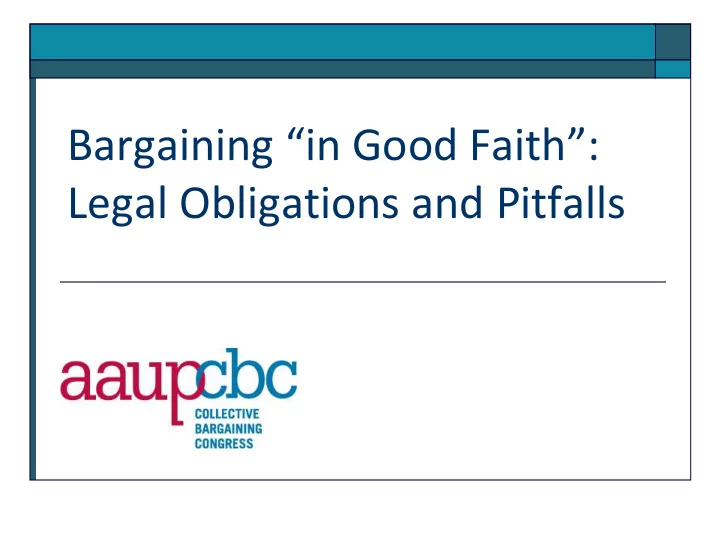

Bargaining “ in Good F aith”: Legal Obligations and Pitfalls
Staff Gwen Bradley Here to help with technical issues
Presenter Michael Mauer, Esq. Senior Labor Advisor, AAUP
What We’ll Cover Bargaining “in good faith”: how to avoid (or how to set up) an unfair labor practice charge
Origins of the Obligation Private sector Public sector 1935 Wagner Act State and local laws all (NLRA): obligation of mandate “good faith” employers to bargain at But different degrees the request of a union of specificity, and 1947 Taft-Hartley varying interpretations amendments to NLRA: by courts and labor obligation extended to boards unions
Section 8(d) of the NLRA “For the purposes of this section, to bargain collectively is the performance of the mutual obligation of the employer and the representative of the employees to meet at reasonable times and confer in good faith with respect to wages, hours, and other terms and conditions of employment, or the negotiation of an agreement or any question arising thereunder, and the execution of a written contract incorporating any agreement reached if requested by either party, but such obligation does not compel either party to agree to a proposal or require the making of a concession…”
Two Categories of Violations Per se violations: Violations based on general -- the fact that an act has course of conduct: occurred suffices to establish an unfair labor practice -- examines the “totality of the (ULP) conduct” -- inquiry: did a party approach -- no need to prove bargaining with “a sincere motivation, or any other resolve” to reach agreement? aspect of the context in which the act occurred
Potter Stewart 1915 - 1985 “I shall not today attempt further to define the kinds of material I understand to be embraced within that shorthand description, and perhaps I could never succeed in intelligibly doing so. But I know it when I see it…” Concurring opinion, Jacobellis v. Ohio , 378 U.S. 184 (1964)
Per se Violations Refusal to Refusal to Refusal to meet furnish relevant execute a written (at all) information agreement Direct dealing Insisting to with unit point of impasse employees on a permissive (bypassing the subject of exclusive bargaining representative)
Where to Draw the Line? “ Boulewarism ” “take it or leave it” Hard bargaining
Appearances vs. Reality Surface Good faith bargaining bargaining
Logistics Availability to meet Delaying tactics Identity of negotiators Authority of negotiators Ground rules
Table Dynamics Did the other side… Make Make regressive proposals? proposals? Offer to Make change concessions? position? Offer counter- proposals?
ULP? You Decide… “I would prefer not to.”
Timing Issues Timing of proposals Timing of counterproposals Deadlines for acceptance
Content of Proposals “No self respecting union could accept that proposal.”
Enforcement Relief may lie through ULP or grievance procedures At table: threat of enforcement Away from table: fodder for campaign Other strategic implications, including setting up a strike Offensive + defensive considerations
Bad Faith During Life of Contract Unilateral changes to terms and conditions of employment Repudiation or noncompliance? -- Degree? -- Frequency?
Thank you! Michael Mauer www.aaupcbc.org mmauer@aaup.org
Recommend
More recommend